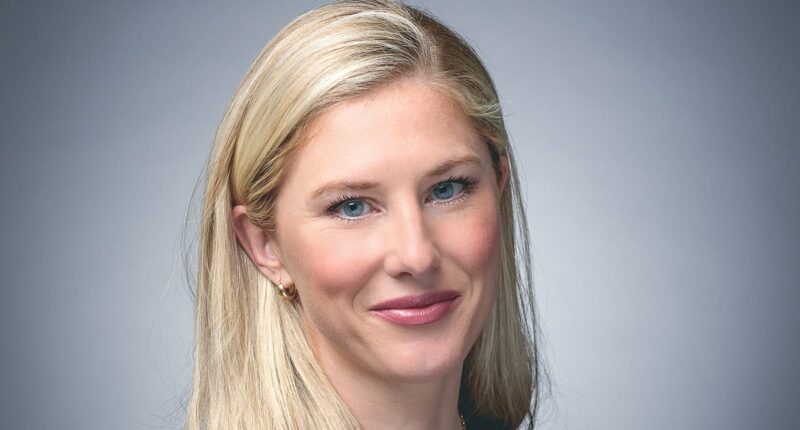Share this @internewscast.com
As concerns about a potential stock market crash persist, many are left wondering how to safeguard their finances effectively.
Financial authorities, including the Bank of England and the International Monetary Fund, have issued warnings about possible market instability. These concerns stem from high global debt levels, a potential bubble in artificial intelligence (AI) stocks, and defaults among high-risk lenders.
While financial advisors consistently recommend maintaining a long-term investment approach and resisting the urge to sell in panic, the thought of your hard-earned savings losing value can be unsettling.
During times of economic uncertainty, diversification is crucial. By spreading investments across various assets, industries, and geographical regions, investors can mitigate risk, as it’s unlikely that all areas will experience a downturn simultaneously.
Continuing with your regular investment routine is also prudent. Timing the market is notoriously challenging, so investing steadily over time, regardless of market conditions, helps ensure you’re not investing everything just before a decline and allows you to capitalize on lower prices when the market dips.
However, implementing these strategies can be challenging. So, how are professional investors navigating these uncertain waters? We reached out to leading fund managers and investment experts to learn about their current portfolio strategies.
> Read more: Our round-up of the best investment platforms
Judith MacKenzie, head of Downing fund managers

Judith MacKenzie wants to avoid having too much of her money in the US
I am cautious on the current outlook for markets, and know there is a bubble about to burst. Just don’t ask me when.
Mostly I invest in funds and investment trusts, and because my own specialism is in UK smaller companies I tend to invest there too. I currently hold the Oryx International Growth fund, which focuses on companies of this size.
I also want to spread my money across other geographies and sectors, but want to avoid having too much of my money in the US so have left the Magnificent Seven [the name given to the biggest tech stocks including Amazon, Apple and Meta] investment party early.
I have nudged my niece and nephew towards the Spyglass US Growth fund, which focuses on smaller American companies. It will be a volatile fund, but because they are younger they can wait out the ups and downs. It is a long-term holding to sit alongside more sensible stuff in a portfolio.
Abby Glennie, co-manager, Abrdn UK Smaller Companies Growth Trust

Abby Glennie has put more money into fixed-rate savings bonds over the past couple of years
For me, the stock market has always been the obvious place to park my savings because the interest rates on cash savings accounts tend to feel uninspiring. However, I have put more money into fixed-rate savings bonds over the past couple of years as interest rates have been higher.
This also gives me some balance away from the stock market.
Recently, diversification – spreading my money across different types of investment – is something I’ve been spending more time considering.
I have been giving more thought to whether there will be a stock market crash.
As a result, I’ve started to sell some of my investments in big US companies.
I think that smaller companies in the UK and Europe look like better value right now.
The question is what to do with the money I have freed up from selling my US investments.
Given how good gold has been, I have looked at that, but after its recent run [up about 50 per cent over a year], I’m thinking I’ll park it either in cash or a bond fund, and reinvest in the stock market at some point in the future when things have settled down.
David Roberts, head of fixed income at Nedgroup Investments

David Roberts invests in high-quality corporate bonds and some UK government bonds
In uncertain markets it is crucial to know the difference between investment and speculation. I want investments that can be analysed, whose earnings can be calculated, and whose potential downside can be predicted. That’s why I don’t invest in cryptocurrencies such as Bitcoin.
How one invests should depend on personal circumstance: age and life stage, so to speak. I’m in my 50s, no mortgage, empty nest, so I need to concentrate on protecting my wealth rather than growing it.
Because of that I invest in high-quality corporate bonds [debt issued by strong companies], which pay interest of 4-5 per cent. I also own some UK government bonds, known as gilts.
If you hold these directly, any gains you make are tax-free. Would I suggest a similar strategy to a 25-year-old? Absolutely not.
I find investing in shares horribly dull. I owned Compass, the food services group, for five years and it is up about 700 per cent. I also own Lloyds Bank, which is up 50 per cent year to date.
> Read more: Investing for beginners
Jane Sydenham, Rathbones investment director

Jane Sydenham wants to be invested in the fast-growing US tech industry
The hard truth is that we never know what markets will do in the short term, but we do know that over the long term they rise. What matters is that we invest appropriately for our timeframe.
My children will not need access to their savings for ten years or more, so can invest in high-growth industries such as technology and healthcare. AI is the subject of a lot of debate at the moment, but over that timeframe I believe it is likely to change the world. Because my children don’t need to access their money, they don’t need to worry about short-term ups and downs on the stock market.
For me, I have been reducing my investments in areas that have done well in order to bank some profits. These include technology, and several UK, European, Japanese and Asian stocks and funds.
I plan to reinvest that money into other assets to spread my risk, which will help to provide some protection in the event of a market crash. I want to be invested in the fast-growing US tech industry, but diversifying into other areas is essential at the moment.
James Henderson, manager of Lowland Investment Company

James Henderson says the UK stock market is quite cheap, with companies paying reliable dividends
I believe the doom and gloom about the stock market and economy is exaggerated – it is not looking at what is actually happening, which is modest growth and fairly full employment. That makes it an interesting time to be an investor.
Theoretically, having a cash buffer in case of an emergency is a nice idea, but, personally, if I have any savings, I usually just put them into the stock market.
Recently I’ve been giving away shares in Law Debenture and Lowland, the two investment trusts I manage. Not because I don’t believe in them, but as an inheritance tax planning strategy ahead of the Budget. I’ve been giving the shares to my children, who are in their 20s and 30s, and urging them to stick with the investments. The UK stock market is quite cheap, with companies paying reliable dividends, which I believe will grow. For me, it is all about stocks and shares – if you look at charts over time, you can see how they have outperformed other types of investment.
I buy more when they are out of favour and stay committed. Lowland has 10 per cent of its portfolio in stocks on the Alternative Investment Market (Aim) – the most it has ever had. Aim is sometimes called a ‘wild west’ because it has less strict regulations than the main FTSE stock market, but there are good businesses in there.
Annabel Brodie-Smith, director of communications at Association of Investment Companies

Annabel Brodie-Smith is a contrarian investor and likes to invest in sectors that are ‘unloved and sometimes underperforming’
Having invested through the dotcom bust, the financial crisis and the Covid pandemic, I’m not worried about the prospect of the AI bubble bursting.
My portfolio contains a mix of investment trusts, with holdings in the UK, US, Europe, Japan and emerging markets – as well as the big US tech stocks that have benefited from AI spending.
Recently I have been putting more money into areas that are out of favour with other investors, such as private equity, property, infrastructure and renewable energy.
I’m a so-called contrarian investor – which means I like to go against the herd and invest in sectors that are unloved and sometimes underperforming, but which I believe will recover over time.
I carry this strategy into my children’s Junior Isas too. One of their top performers is a private equity investment trust which invests in businesses not yet listed on the stock market.
Even in difficult times, I believe there are opportunities for those who are willing to do some detective work and dig deep into unloved areas.
Emma Wall, chief investment strategist at Hargreaves Lansdown

Emma Wall has been grateful for her investments in gold over the past year
I try to take a balanced approach with my investments to build a portfolio that can deliver regardless of what happens on the stock market.
In the past year I have been very grateful for my investments in gold and gold-related companies.
The Troy Trojan fund is great to add ballast, and is up 9 per cent year to date thanks to its gold investments – not bad for a fund whose aim is to protect against losses rather than focusing on growth. I also own BlackRock World Mining trust, which invests in gold miners.
Other holdings include the iShares S&P 500 exchange-traded fund (ETF), a low-cost fund that tracks the US stock market, and Artemis Global Income, a so-called value fund, which focuses on out- of-favour businesses – it doesn’t invest much in technology stocks, so should do well if there is a market dip.
In my pension I hold Schroders Managed Balanced, a multi-asset fund where the manager chooses where to invest based on where they see the best opportunities. I like that it has a wide variety of holdings, including renewable energy, food and water funds and UK government gilts.
Stephen Yiu, manager of Blue Whale Growth fund

Stephen Yiu’s fund only invests in between 25 to 30 companies
My fund is my only investment.
It’s a so-called high conviction portfolio, meaning we only invest in 25-30 companies. That is very different from investing in the entire stock market – there are 1,325 in the global index, and there is a good reason I don’t own 1,295 of them.
I am confident my 30 stocks can do well regardless of what happens in the market over the next couple of years.
With all the talk about a potential AI bubble burst, I have taken some of the profits from my investments in companies involved in the sector, including Oracle, Vertiv, Nvidia and Broadcom. I have completely sold out of Meta and Microsoft, because I feel cautious about companies spending a lot on AI.
I am also investing in so-called defensive companies that should hold up well in a stock market dip. These include companies such as Philip Morris and Leonardo.
Even if I became very cautious about what happens next, I wouldn’t panic sell. It’s time in the market, not timing the market, that makes you the most money.
Undoubtedly my age plays a part in my strategy. I’m in my mid-40s. If I were retired, I might have less money in the stock market, but while I’m still earning and of working age, I plan to have as much invested as possible.
Nick Train, Finsbury Growth & Income trust manager

Nick Train says the key question is ‘whether AI is a threat or opportunity for the businesses we hold;
I’ve been a persistent buyer of my Finsbury Growth & Income trust for 25 years, and recently invested more following a challenging period of performance.
The key question at the moment is whether AI is a threat or opportunity for the businesses we hold, such as London Stock Exchange Group and Relx.
I’m in the latter camp and believe AI can help to make these firms even more valuable.
Away from AI, I continue to look for unique, semi-eternal consumer brands. Brands such as Dove [owned by Unilever], Guinness [owned by Diageo] and Burberry will endure for decades to come.
Because their customers are loyal, these firms have pricing power – which means they can raise prices to protect the business from rising costs without seeing their sales impacted.
In an age of technology change and disruption, that durability should be highly valued by investors – but it doesn’t seem to be, meaning I can buy more shares at low prices.
DIY INVESTING PLATFORMS
AJ Bell

AJ Bell
Easy investing and ready-made portfolios
Hargreaves Lansdown

Hargreaves Lansdown
Free fund dealing and investment ideas
interactive investor

interactive investor
Flat-fee investing from £4.99 per month
InvestEngine

InvestEngine
Account and trading fee-free ETF investing
Trading 212
Trading 212
Free share dealing and no account fee
Affiliate links: If you take out a product This is Money may earn a commission. These deals are chosen by our editorial team, as we think they are worth highlighting. This does not affect our editorial independence.
Compare the best investing account for you







